Usha’s Pickle Digest
by Usha Prabakaran
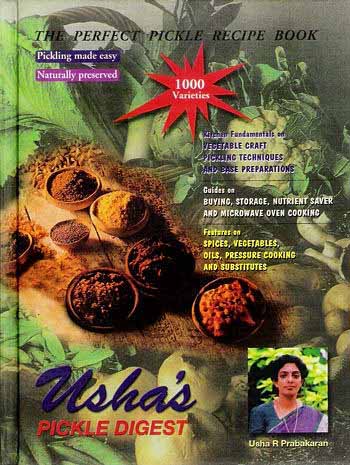
Published in 1998 by the author’s own Pebble Green Publications in Chennai, India.
It was late April and I was browsing the cookery shelves of a bookstore in Mumbai. Like all avid collectors of one thing or the other, I have learnt to quickly pick grain from chaff. My expertise is, of course, aided by the fact that the food-and-drink sections of all mainstream bookstores in India look alike: piles of publications from serial cookbook writers and compilers, a few guides to eating in city XYZ, coffee-table tomes from foreign publishers, and “chef’s series” pocket books. I rapidly scan the spines of these books, eyes peeled for the unusual or the local. That day, however, I flipped through “Cooking in Six Minutes” by one of the aforementioned copious authors. A few books down the shelf, I came across “Cooking in Three Minutes” by the same author. I wondered how far this series would go, and sure enough, out tumbled “Cooking in 60 Seconds”. Just like all problems of this world can be solved if you smile and think positively, so will you be relieved of your kitchen burdens if you think of cooking as the time that a pot spends in contact with the stove. Maybe it was the blistering summer heat or maybe I had looked at one cookbook too many, but I suddenly felt weary of the pervasive silliness of the food publishing world. For an antidote, I turned to two things: slow, sun-cooked pickles that would take days or weeks before they were ready, and a cookbook narrow in its focus, yet unmatched in range and depth.
Usha’s Pickle Digest is the definitive book for Indian pickles; the first and probably the last word on vegetarian pickles, unless the author publishes a second volume. There is not much I can say about the Digest or about Usha that has not already been said elsewhere. One vaguely knew that India has a vast repertoire of traditional pickles, but one did not know that a thousand pickles across 131 ingredients are within the realm of possibility. One had heard of mango pickles, lemon pickles, chilli pickles, tomato pickles, even okra pickles; but pickles made out of coconut, kokum, hibiscus flowers, artichokes, sugarcane, pomegranate, or spinach were beyond our imagination. All the recipes rely only on natural preservatives such as salt, oil, vinegar, and spices. The life of each pickle is indicated at the end of the recipe. There is also something very satisfying about the meticulousness with which the recipes have been titled and indexed for easy access. Even if pickles do not tickle your culinary fancies, the book offers plenty – an extensive glossary of ingredients in ten languages along with botanical names, methods to detect adulteration, buying and storage guides, and several other practical kitchen tips.
The best part of this book for me personally, however, is the profound sincerity of purpose underlying this work. The Digest was published neither for fame nor money. Usha’s patent enthusiasm and desire to share the results of her pickling research is the driving force of this book. We tend to romanticize secrecy in the culinary arts. Prized recipes and techniques are either kept shrouded in mystique or published omitting an ingredient here or instruction there. Clearly, the recipes and kitchen wisdom in this book have been developed through years of diligent and sustained effort. That she went the several extra miles to present her knowledge in a clear and forthcoming manner indeed commands our respect. It is also why we keep rummaging tons of chaff in search of a few precious grains.
Ingredients:
500 grams cut raw mango, small pieces
75 grams salt (use kosher or crystal salt)
35 grams chilli powder
10 grams fenugreek seeds
10 grams cumin seeds
5 grams asafoetida
200 ml sesame oil
5 grams mustard seeds
A few sprigs curry leaves
Method:
Sprinkle salt on the mango pieces and marinate for a day. Next day, remove the mango pieces from the resulting juices (“salt waterâ€Â). Reserve these juices in a refrigerator.
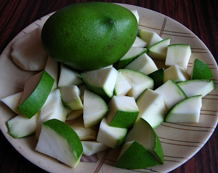
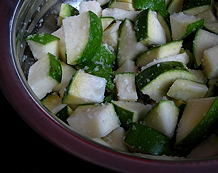
Place the mango pieces on a steel tray or thali and sun-dry for four days (till the mango pieces are three-fourths dry).
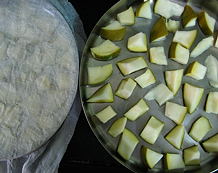
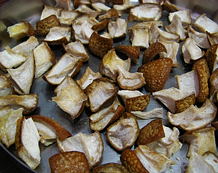
At the end of the fourth day, roast in a little oil the fenugreek seeds, cumin seeds, and asafoetida and grind to a powder. Combine with the chilli powder and add this spice-blend to the dried mango pieces.
Heat the sesame oil, add the mustard seeds and curry leaves, and allow to crackle. Pour in the salt water and an equal volume of plain water. When the mixture begins to boil, stir in the mango mixture. Let it come to a boil again, and then remove from heat.
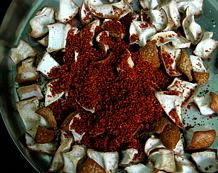
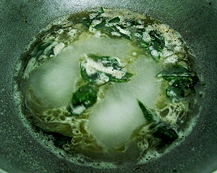
The pickle is ready to use after five days. It lasts for six months.
Notes:
I have presented the ingredients as originally provided in the book. When I prepared this pickle, however, I had neither measuring cups/spoons nor a weighing scale handy. I kept tasting throughout the process. You can adjust the spices according to your taste and the tartness of the mangoes, but please do so in a way that maintains the balance of flavours. The primary tastes in this pickle should be sour, chilli-hot, and salty.
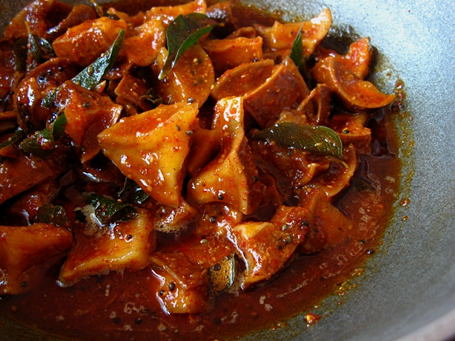
Text and Photographs: Veena Parrikar
Previously in the Cookery, Indic Series:
Introduction
Salads for All Occasions – Vijaya Hiremath
Cooking with Green Leafy Vegetables – Shyamala Kallianpur
Regional Rustic Recipes by Manipal Mahila Samaj
